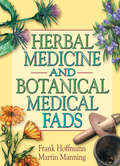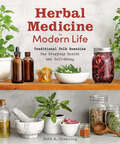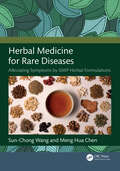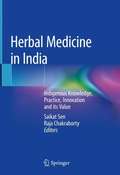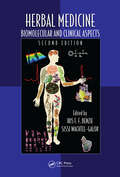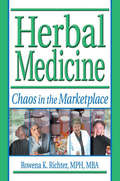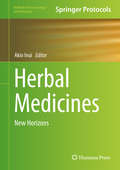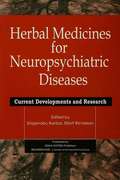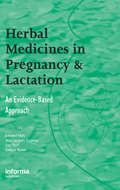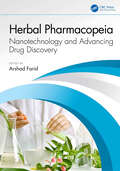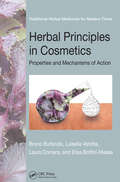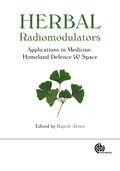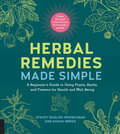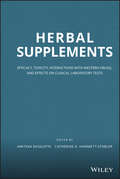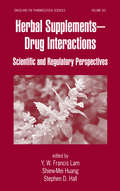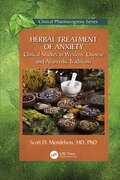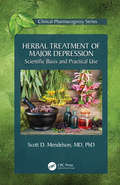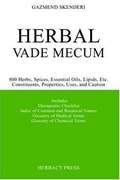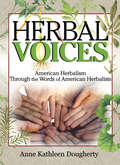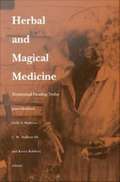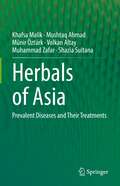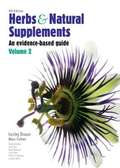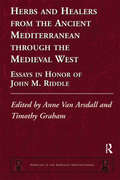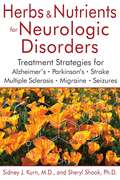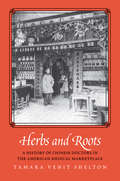- Table View
- List View
Herbal Medicine and Botanical Medical Fads
by Frank Hoffmann Martin J ManningFind all the information you need on herbs and spices in one place!Herbal Medicine and Botanical Medical Fads is an A-to-Z reference book written in a straightforward style that’s informative enough for library use but informal enough for general reading. This essential guide takes a practical look at the popular uses of herbs and spices, presented in an easy-to-use format. The book is a refreshing alternative to the how-to guides, cookbooks, and picture books usually found on the subject.From alfalfa to ginseng to yellow dock, more than 100 entries are included, featuring historical backgrounds, popular and practical uses, folklore, and bibliographies. Herbal Medicine and Botanical Medical Fads also contains related listings and essays that range from alternative medicine to food preparation and nutrition to herbs in wedding celebrations. Detailed enough for reference use by academics, the book has a natural tone that appeals to garden club members, herb and spice experts, hobbyists, and others. Herbal Medicine and Botanical Medical Fads also includes information on: herb growing and marketing herbs and spices in literature medicinal herbs and spices federal regulations on herbs and spices horticulture therapyAn everyday guide for enthusiasts and a perfect place to start for newcomers, Herbal Medicine and Botanical Medical Fads is an easy-to-use handbook with wide-ranging appeal. It combines the comprehensive information you&’d expect from a reference book with a casual and colorful look at the histories and backgrounds of herbs and spices, both commonplace and exotic. As a vital resource or an occasional reference, this book is unique in its scope and invaluable in its usefulness.
Herbal Medicine for Modern Life: Traditional Folk Remedies for Everyday Health and Well-Being
by Ruth BlandingProtect, heal, and revitalize your health with herbal remedies crafted to treat ailments from modern livingIn today&’s busy world, our disconnection from the earth has led to an overreliance on health interventions that don&’t always work. With Herbal Medicine for Modern Life, you&’ll discover the enduring wisdom of plant medicine with an herbalist who draws on her connection to the ancestors and nature to support health and wellness. With her expert advice, you&’ll learn how to benefit from the folkloric use of plants: how to use them to heal the root causes of many modern ailments and bring you back to feeling balanced, healthy, and whole again. Ancient Remedies for Modern Needs. Learn to tap into traditional medicine for modern health issues like anxiety, allergies, hormone imbalances, and more.Approachable, Affordable Herbalism. Make safe and powerful herbal medicine in the comfort of your home with easy-to-source medicinal plants and everyday tools.Profiles of Powerful Medicinal Plants. Discover more than 35 medicinal herbs with photos and details about therapeutic actions, contraindications, and healing qualities. Wide Range of Herbal Remedies. Follow step-by-step recipes to craft infusions, tinctures, syrups, balms, powders, and other common herbal preparations.
Herbal Medicine for Rare Diseases: Alleviating Symptoms by GMP Herbal Formulations
by Sun-Chong Wang Meng-hua ChenMany rare diseases are genetic and lack effective cures. Herbal medicine, developed by ancient healers without the benefit of modern cell biology knowledge, focuses on alleviating symptoms associated with uncommon conditions. Herbal Medicine for Rare Diseases: Alleviating Symptoms by GMP Herbal Formulations adopts an herbal medicine approach to addressing signs and symptoms of rare diseases.Each herb possesses a multitude of compounds that allow it to treat various conditions, while a single condition can often be addressed by several different herbs, illustrating complex relationships that artificial intelligence (AI) excels at deciphering. The herbal prescriptions in this book are generated using AI models, trained on a decade's worth of medical insurance data from Taiwan, featuring the use of Good Manufacturing Practice (GMP)-certified traditional Chinese medicine (TCM) products. The connection between deep learning and big data ensures that the trained AI model represents the collective wisdom of ~5,000 herbal medical doctors in Taiwan who contributed to the training data.Features Prescribes granulated herbal products sourced from GMP-certified manufacturers to ensure quality and safety Provides precise dosage information for the GMP herbal products in every prescription Includes a wealth of common and alternative herbal prescriptions tailored for specific conditions or combinations thereof Cites evidence from preclinical and clinical studies of the herb and formula to offer insights into their efficacy and mechanisms In each section Herbal Medicine for Rare Diseases: Alleviating Symptoms by GMP Herbal Formulations, AI-generated prescriptions are meticulously annotated with evidence from modern pharmacological and phytochemical studies of the herbs and multi-herb formulas included in the prescriptions. This book is beneficial for health professionals and practitioners, particularly those who specialise in complementary, alternative, and herbal medicine.
Herbal Medicine in India: Indigenous Knowledge, Practice, Innovation and its Value
by Saikat Sen Raja ChakrabortyThis book highlights the medical importance of and increasing global interest in herbal medicines, herbal health products, herbal pharmaceuticals, nutraceuticals, food supplements, herbal cosmetics, etc. It also addresses various issues that are hampering the advancement of Indian herbal medicine around the globe; these include quality concerns and quality control, pharmacovigilance, scientific investigation and validation, IPR and biopiracy, and the challenge that various indigenous systems of medicine are at risk of being lost. The book also explores the role of traditional medicine in providing new functional leads and modern approaches that can offer elegant strategies for facilitating the drug discovery process. The book also provides in-depth information on various traditional medicinal systems in India and discusses their medical importance. India has a very long history of safely using many herbal drugs. Folk medicine is also a key source of medical knowledge and plays a vital role in maintaining health in rural and remote areas. Despite its importance, this form of medicine largely remains under-investigated. Out of all the traditional medicinal systems used worldwide, Indian traditional medicine holds a unique position, as it has continued to deliver healthcare throughout the Asian subcontinent since ancient times. In addition, traditional medicine has been used to derive advanced techniques and investigate many modern drugs. Given the scope of its coverage, the book offers a valuable resource for scientists and researchers exploring traditional and herbal medicine, as well as graduate students in courses on traditional medicine, herbal medicine and pharmacy.
Herbal Medicine: Biomolecular and Clinical Aspects, Second Edition (Oxidative Stress and Disease)
by Iris F. F. Benzie Sissi Wachtel-GalorThe global popularity of herbal supplements and the promise they hold in treating various disease states has caused an unprecedented interest in understanding the molecular basis of the biological activity of traditional remedies. Herbal Medicine: Biomolecular and Clinical Aspects focuses on presenting current scientific evidence of biomolecular ef
Herbal Medicine: Chaos in the Marketplace
by Virginia M Tyler Rowena RichterAmericans seeking herbal medicines now face confusion and even danger. There is great potential for these medicines to improve the health of consumers--if current regulations can be revised!Herbal Medicine: Chaos in the Marketplace is a prize-winning critique of the regulation and business of herbal medicine in the United States. It is the first book that examines the big picture issues-it tells the story of how the present situation developed, looks at what it means for consumers, compares approaches taken in other industrialized countries, and recommends where we need to go from here. Convenient reference tables provide easy access to information.Concerns about herbal medicines are hitting the headlines regularly, yet no other book has examined the core issues in depth from a public health perspective. Herbal Medicine: Chaos in the Marketplace fills that gap. It is highly relevant today, and you’ll find it will continue to be indispensable reading for years to come as the situation plays out.This balanced, unique, and insightful volume will add to your knowledge of herbal medicine regulation and its impact on consumer health by: framing the limitations of the current situation with brief examples reviewing the regulatory history of herbal medicines in the United States placing the situation in an international context by also examining regulations in Canada, Germany, France, and the United Kingdom illustrating the practical implications of U.S. regulations with six examples that demonstrate how herbal medicines could contribute more to consumer health--and the public health risks associated with the current regulatory situation analyzing the public health issues related to safety, research, clinical practice, consumer interests, business, media, and federal government offering key, high-impact recommendations for future policyConsumers, health care professionals, business people in the domestic and foreign herb industries, researchers, health plan executives, food and drug attorneys and policymakers, as well as educators and students, will all find this book essential to their understanding of the workings of the herbal medicine industry. Visit the author’s website at http://www.herbalchaos.com
Herbal Medicines
by Aiko InuiThis book examines the use of herbal medicine in the treatment of intractable diseases as well as common health problems. Given the stringent quality control of herbal medicine such as Kampo and reproducibility of preclinical findings, together with overall fewer adverse events, its attractiveness continues to rise, and multi-component herbal medicine capable of targeting multiple sites can be useful for future drug discovery. Written for the Methods in Pharmacology and Toxicology series, this collection features practical advice for hands-on work in this exciting and expansive field. Authoritative and easily applicable, Herbal Medicines: New Horizons summarizes the current state and translational aspect of herbal medicine in modern society in order to help establish a rational therapy for patients.
Herbal Medicines for Neuropsychiatric Diseases: Current Developments and Research
by Shigenobu Kanba Elliott RichelsonPublished in 1999, Herbal Medicines for Neuropsychiatric Diseases is a valuable contribution to the field of Psychiatry/Clinical Psychology.
Herbal Medicines in Pregnancy and Lactation: An Evidence-Based Approach
by Gideon Koren Edward Mills Jean-Jacques Dugoua Dan PerriJust as with prescription drugs, natural health products can present substantial risks and prompt the same areas of concern. Although some of these effects may be life-threatening, current literature on these important issues is scant.With the use of natural health products on the rise, physicians require quality evidence with which to make evi
Herbal Pharmacopeia: Nanotechnology and Advancing Drug Discovery
by Arshad FaridThis book comprehensively explores the intersection between traditional herbal medicine and cutting-edge nanotechnology. The chapters introduce modern techniques used in herbal extraction and analysis. The principles of drug discovery from plants are discussed, with a focus on the identification and development of bioactive compounds that have therapeutic potential. It discusses the pharmacological properties, biotechnological approaches in drug development, and challenges in the formulation and standardization of herbal medicines. Emerging trends and applications of nanotechnology in herbal pharmacotherapy, such as nanoparticle synthesis, enhanced bioavailability using nanocarriers, safety assessments, novel and targeted delivery systems, and regulatory considerations, are thoroughly discussed. Additionally, it includes a comparative analysis of traditional and nano-formulated approaches and their implementation in clinical settings. Towards the end, the book reviews the regulatory considerations for herbal products and future perspectives in herbal pharmacopeia. This book is intended for researchers, clinicians, and professionals in herbal medicine, pharmacology, and nanotechnology.
Herbal Principles in Cosmetics: Properties and Mechanisms of Action (Traditional Herbal Medicines for Modern Times)
by Luisella Verotta Bruno Burlando Laura Cornara Elisa Bottini-MassaInterest in the molecular and mechanistic aspects of cosmetic research has grown exponentially during the past decade. Herbal Principles in Cosmetics: Properties and Mechanisms of Action critically examines the botanical, ethnopharmacological, phytochemical, and molecular aspects of botanical active ingredients used in cosmetics. Along with dermato
Herbal Radiomodulators: Applications in Medicine, Homeland Defence and Space
by Rajesh AroraThis book discusses the potential of radiation countermeasure agents and radiosensitizers of herbal origin, their multifaceted mode of action, specifically the use of the former in a nuclear theatre of operations, rescue operations and deep space missions in addition to their application during radiotherapy.
Herbal Remedies Made Simple: A Beginner's Guide to Using Plants, Herbs, and Flowers for Health and Well-Being
by Susan Gregg Stacey Dugliss-WesselmanA do-it-yourself guide to natural healing products, with instructions on choosing plants and recipes for creating alternative wellness solutions at home.Natural alternatives to traditional medicines are everywhere, even right outside your door! Herbal Remedies Made Simple is an easy and fun way to learn about the many different healing herbs that grow all around us but we seldom see. The best part: once you’re familiar with the natural healing herbs around you, Herbal Remedies Made Simple provides you with instructions on creating your own DIY herbal remedies at home.This unique guide book splits its pages in half. The top halves of the pages detail different remedies and recipes for health, personal care, and home care. The bottom pages provide reference material on the herbs used in the project above; detailing the plant’s medicinal properties and how best to work with that herb.Some of the therapeutic recipes within:Lavender cleanserRose water tonerChamomile facial exfoliantComfrey joint and bruise salveNerve tonic tinctureTeas for headaches, stress, sleep, and coldsJoint and muscle soakFully photographed and illustrated, this is the perfect guide for the beginning herbal practitioner.
Herbal Supplements
by Catherine A. Hammett-Stabler Amitava DasguptaThis book focuses on efficacy, toxicity, drug interactions, and abnormal clinical laboratory tests resulting from the use of herbal remedies. Although a few herbal remedies are safe and have efficacy (for example saw palmetto), many herbal remedies are toxic. This book guides in the interpretation of abnormal test results in otherwise healthy subjects due to use of herbal remedies. Chapters focus on interactions between herbals and pharmaceuticals, sources of contamination in herbal supplements, and analytical techniques used in the investigation of herbal remedies.
Herbal Supplements-Drug Interactions: Scientific and Regulatory Perspectives (Drugs and the Pharmaceutical Sciences)
by Shiew-Mei Huang Stephen D. Hall Y W. Francis LamThe international popularity of herbal remedies has recently outpaced quality information on the utilization and dosing of these compounds. This book fills a void in the literature by offering an authoritative overview of the mechanisms of herbal remedies and their impact on standard medications. It offers a practical approach that focuses not only
Herbal Treatment of Anxiety: Clinical Studies in Western, Chinese and Ayurvedic Traditions (Clinical Pharmacognosy Series)
by Scott D. MendelsonHerbal Treatment of Anxiety: Clinical Studies in Western, Chinese and Ayurvedic Traditions explains the nature and types of anxiety, its neurobiology, the pathophysiology that exacerbates and perpetuates it, and the psychopharmacology of the chemical agents that relieve its manifestations. Throughout the text are discussions of Western, Chinese and Ayurvedic herbal treatments that have been clinically shown to be effective in relieving anxiety. The book also features a scientific discussion of the use of herbs and essential oils in aromatherapy and the mechanisms by which they may work. The book concludes by providing bases upon which herbs can be chosen to treat the anxiety of patients according to their individual needs. Additional features include: Examines the increasingly popular subject of the use of herbs as a natural alternative treatment and provides a much-needed scientific basis for treatments often considered as merely "folk medicine." Discusses the psychoactive phytochemicals contained in herbs. Includes a chapter discussing the nature and mechanisms of action of adaptogens. Adds to the armamentarium of anxiolytics for providers who have become reluctant to prescribe benzodiazepines as treatment of anxiety, particularly in the context of the opiate crisis. Gives an introduction to herbal treatments of traditional Chinese and Ayurvedic medicine. Offers practical advice on initiating and managing herbal treatments. Herbal Treatment of Anxiety is a valuable reference for psychiatrists, psychiatric nurse practitioners, primary care providers, naturopathic doctors and therapists interested in the most current scientific information on the effects of herbal treatments of anxiety disorders.
Herbal Treatment of Major Depression: Scientific Basis and Practical Use (Clinical Pharmacognosy Series)
by Scott D MendelsonThis unique volume presents new understandings of the neurochemical nature of major depression, and how herbs and their constituent flavonoids and terpenes appear to address some of the mechanisms now thought to be involved. It explores how recent studies of the rapid antidepressant effects of ketamine inform neuroscientists about deep intracellular mechanisms of antidepressant action that have little to do with simple enhancement of monoaminergic activity. These mechanisms include actions on PI3K, Akt, mTOR, GSK3, BDNF, and other intracellular pathways. New theories of the pathophysiology underlying major depression, such as oxidative damage, inflammation, stress and insulin resistance are then explored.Key Features: Focuses on oxidative damage, inflammation, and metabolic syndrome. Explains that a significant percentage of people treated for major depression obtain little if any relief from standard antidepressant medications. These facts lead to discussion of herbs that can be used to treat major depression, as well as consideration of the scientific basis for how these herbs act. The antidepressant properties of 66 herbs are discussed, along with dosing and safety information.
Herbal Vade Mecum: 800 Herbs, Spices, Essential Oils, Lipids, Etc. - Constituents, Properties, Uses, and Caution
by Gazmend SkenderiFrom Acerola used as a supplement of vitamin C and minerals to Zedoary used as a spice and for digestive problems; from herbs used for anxiety and restlessness to those used as insect repellent
Herbal Voices: American Herbalism Through the Words of American Herbalists
by Ethan B Russo Anne DoughertyLearn how traditional herbal practitioners are responding to the sudden, massive popularity of herbal medicine! Herbal Voices: American Herbalism Through the Words of American Herbalists examines how herbal practitioners who started in the 1960s and 1970s are reacting to the mainstream popularity of herbal medicine today. This unique book features interviews with 20 of America&’s most prominent herbalists-focusing on their careers, their beliefs, and their perspectives on the contemporary herbal product boom in recent years. Also included is important information on herbal organizations, publications, schools, and companies where seeds and rootstock of endangered medicinal plants can be obtained, as well as a list of the United Plant Savers&’ "At Risk" and "To Watch" medicinal plants. Herbal Voices synthesizes the words of a representative group of herbalists into a compelling picture of modern American herbalism as they offer their opinions on the roles of science, folklore, and spirituality in herbal medicine. This timely resource addresses controversial issues that arise within the herbal community, such as the endangered plant crisis, professionalism and licensure, and shifting the American consciousness toward a more Earth-centered way of life and health. In Herbal Voices, you&’ll hear from many well-known herbal practitioners, including: Rosemary Gladstar-founder of The California School of Herbal Studies and United Plant Savers, co-founder of Sage Mountain Herbs, and author of Herbal Healing for Women and of the Sage Healing Way series James Green-former Director of The California School of Herbal Studies, a member of the advisory committee for United Plant Savers, and author of both The Herbal Medicine-Makers Handbook and The Male Herbal David Hoffmann-Fellow of Britain&’s National Institute of Medical Herbalists, former President of the American Herbalists Guild, and author of The New Holistic Herbal, An Elder&’s Herbal, and Therapeutic Herbalism Richo Cech-herbalist, owner of Horizon Herbs, executive board member of United Plant Savers, and author of Growing Your Garden Pharmacy Sharol Tilgner-licensed naturopathic physician, founder and current President of Wise Woman Herbals, Inc., editor of Herbal Transitions, associate editor of Medical Herbalism, and author of Herbal Medicines From the Heart of the Earth For the first time, these leading educators, clinicians, and business owners share the joys and pitfalls of practicing an age-old healing tradition in modern America. This rich resource of reflections fills a gap in the existing literature that will be useful for herbalists, herbal enthusiasts, historians, anthropologists, popular culturists, and holistic/alternative medical practitioners.
Herbal and Magical Medicine: Traditional Healing Today
by James Kirkland Holly F. Mathews C. W. Sullivan III Karen BaldwinHerbal and Magical Medicine draws on perspectives from folklore, anthropology, psychology, medicine, and botany to describe the traditional medical beliefs and practices among Native, Anglo- and African Americans in eastern North Carolina and Virginia. In documenting the vitality of such seemingly unusual healing traditions as talking the fire out of burns, wart-curing, blood-stopping, herbal healing, and rootwork, the contributors to this volume demonstrate how the region's folk medical systems operate in tandem with scientific biomedicine. The authors provide illuminating commentary on the major forms of naturopathic and magico-religious medicine practiced in the United States. Other essays explain the persistence of these traditions in our modern technological society and address the bases of folk medical concepts of illness and treatment and the efficacy of particular pratices. The collection suggests a model for collaborative research on traditional medicine that can be replicated in other parts of the country. An extensive bibliography reveals the scope and variety of research in the field. Contributors. Karen Baldwin, Richard Blaustein, Linda Camino, Edward M. Croom Jr. , David Hufford, James W. Kirland, Peter Lichstein, Holly F. Mathews, Robert Sammons, C. W. Sullivan III
Herbals of Asia: Prevalent Diseases and Their Treatments
by Mushtaq Ahmad Muhammad Zafar Münir Öztürk Volkan Altay Shazia Sultana Khafsa MalikMedicinal flora plays an important role in health care systems across the world. Out of the half million flowering plants, around 50.000 species are valued for their therapeutic properties. During the last few decades, 20% of the world’s population used plants and/or their derived products as a source of medicine. WHO stated that 80% population around the globe, specifically the rural communities, depend on medicinal plants for their basic healthcare needs. To this end, plant-based phytochemicals are known to have hepato-protective, anti-carcinogenic, anti-allergic, anti-inflammatory, antimicrobial, antioxidant actions. This book is a guide to ~280 plant species of medicinal flora that demonstrates global relevance. Our goal is to share local knowledge about phytomedicines to a worldwide audience. It is an illustrated reference that documents and preserves the existing knowledge on these plant taxa, with a social and cultural (ethnobotanical) emphasis. This book also provides comprehensive and useful information about traditional uses of medicinal plants by the local communities for the treatment of various prevalent diseases. It contains comprehensive descriptions of each species including family, synonyms, English name, distribution, altitude, habitat, morphological description, life form, part used, mode of utilization, diseases category, recipes, other medicinal uses, phytochemical activity and toxicity.
Herbs And Natural Supplements: An Evidence-based Guide
by Marc Cohen Lesley BraunHerbs and Natural Supplements, 4th Edition: An evidence-based guide is an authoritative, evidence-based reference. This two-volume resource is essential to the safe and effective use of herbal, nutritional and food supplements. The second volume provides current, evidence-based monographs on the 132 most popular herbs, nutrients and food supplements. Organised alphabetically, each monograph includes daily intake, main actions and indications, adverse reactions, contraindications and precautions, safety in pregnancy and more.
Herbs and Healers from the Ancient Mediterranean through the Medieval West: Essays in Honor of John M. Riddle (Medicine in the Medieval Mediterranean #4)
by Anne Van Arsdall Timothy GrahamHerbs and Healers from the Ancient Mediterranean through the Medieval West brings together eleven papers by leading scholars in ancient and medieval medicine and pharmacy. Fittingly, the volume honors Professor John M. Riddle, one of today's most respected medieval historians, whose career has been devoted to decoding the complexities of early medicine and pharmacy. "Herbs" in the title generally connotes drugs in ancient and medieval times; the essays here discuss interesting aspects of the challenges scholars face as they translate and interpret texts in several older languages. Some of the healers in the volume are named, such as Philotas of Amphissa, Gariopontus, and Constantine the African; many are anonymous and known only from their treatises on drugs and/or medicine. The volume's scope demonstrates the breadth of current research being undertaken in the field, examining both practical medical arts and medical theory from the ancient world into early modern times. It also includes a paper about a cutting-edge Internet-based system for ongoing academic collaboration. The essays in this volume reveal insightful research approaches and highlight new discoveries that will be of interest to the international academic community of classicists, medievalists, and early-modernists because of the scarcity of publications objectively evaluating long-lived traditions that have their origin in the world of the ancient Mediterranean.
Herbs and Nutrients for Neurologic Disorders: Treatment Strategies for Alzheimer’s, Parkinson’s, Stroke, Multiple Sclerosis, Migraine, and Seizures
by Sheryl Shook Sidney J. KurnA guide to herbal and holistic medicine for brain health and neurologic disorders• Provides detailed herbal, antioxidant, and nutritional strategies for Alzheimer’s, Parkinson’s, multiple sclerosis, stroke, migraine, and seizures• Supported by scientific studies and years of successful clinical practice• Discusses potential side effects, counter-indications, and the proper dosages to reduce symptoms, slow disease progression, and lessen the chances of recurrenceNumerous medical journals have published studies supporting the use of herbs and nutrients in the treatment of neurodegenerative disorders. Yet in practice most neurologists rarely include them as part of their protocols. In this practical guide, Sidney Kurn, M.D., and Sheryl Shook, Ph.D., explain how to safely and easily incorporate herbs, antioxidants, and nutritional supplements into the standard conventional treatments for 6 common neurologic disorders: Alzheimer’s, Parkinson’s, multiple sclerosis, stroke, migraine, and seizures.For each condition, the authors provide detailed strategies supported by scientific evidence and years of successful clinical practice. They examine the biochemical role of each recommended herb, nutrient, or antioxidant and discuss potential side effects, counter-indications, and proper dosages to reduce symptoms, slow disease progression, and--in the case of stroke, migraine, and seizures--lessen the chances of recurrence. The authors explore the nutrient deficiencies and physiological mechanisms, including inflammation, heavy metal toxicity, and mitochondrial dysfunction, that can cause oxidative injuries and initiate neurologic disorders. They reveal which common substances, such as aspartame and glutamate, can trigger these mechanisms at the cellular level and recommend specific herbs and antioxidants, such as turmeric, cannabinoids, resveratrol, and N-acetyl cysteine, to counteract their effects. They discuss the importance of sleep to overall well-being, especially for those suffering from neurologic disorders, and offer tips to help ensure a good night’s sleep.Integrating neuroscience, biochemistry, herbalism, and decades of clinical experience, the authors lay the scientific foundation for a holistic, naturopathic approach to neurologic disorders and a way to enhance the quality of life for those suffering from these conditions.
Herbs and Roots: A History of Chinese Doctors in the American Medical Marketplace
by Tamara Venit SheltonAn innovative, deeply researched history of Chinese medicine in America and the surprising interplay between Eastern and Western medical practice Chinese medicine has a long history in the United States, with written records dating back to the American colonial period. In this intricately crafted history, Tamara Venit Shelton chronicles the dynamic systems of knowledge, therapies, and materia medica crossing between China and the United States from the eighteenth century to the present. Chinese medicine, she argues, has played an important and often unacknowledged role in both facilitating and undermining the consolidation of medical authority among formally trained biomedical scientists in the United States. Practitioners of Chinese medicine, as racial embodiments of “irregular” medicine, became useful foils for Western physicians struggling to assert their superiority of practice. At the same time, Chinese doctors often embraced and successfully employed Orientalist stereotypes to sell their services to non-Chinese patients skeptical of modern biomedicine. What results is a story of racial constructions, immigration politics, cross-cultural medical history, and the lived experiences of Asian Americans in American history.
